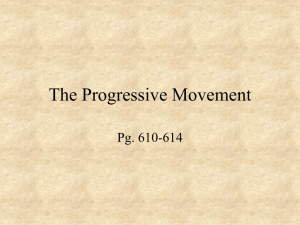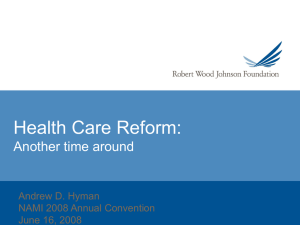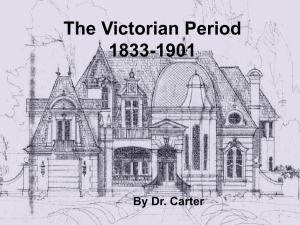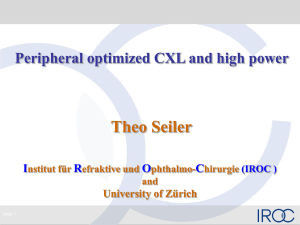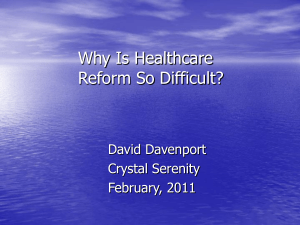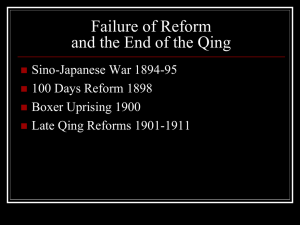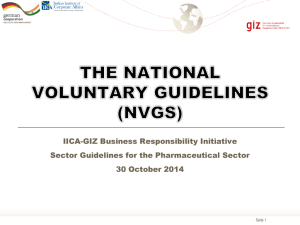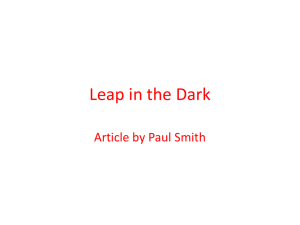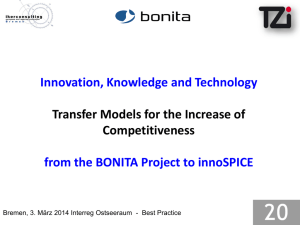The Guidelines for Strategic Policy Reform
advertisement
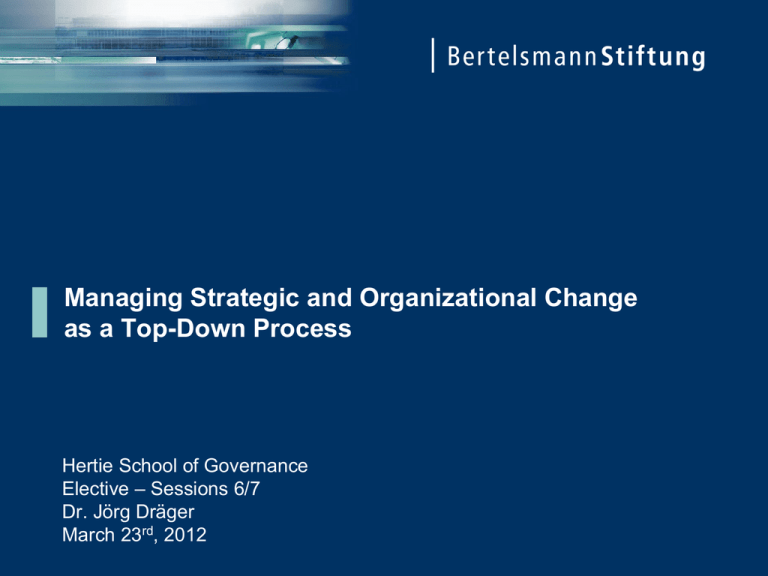
Managing Strategic and Organizational Change as a Top-Down Process Hertie School of Governance Elective – Sessions 6/7 Dr. Jörg Dräger March 23rd, 2012 Bertelsmann Foundation Guidelines for Strategic Policy Reform (Christina Tillmann) 23. März 2012 Page 2 The Guidelines for Strategic Policy Reform offer a practice-oriented framework for planning and analyzing reform processes …help setting priorities …widen the options of action …help optimizing the structure of a reform process …provide orientation What is this framework good for? …develop a longterm strategy …help planning goaloriented reforms 23. März 2012 Seite 3 The Guidelines for Strategic Policy Reform follow the structure of an adapted policy cycle – 1st structuring criterion Problem definition Evaluation Agenda setting Environment/ Media Decision Implementation of policy Adaptations: Core Strategic Group as an separate area of activity ongoing impact evaluation 23. März 2012 Seite 4 The Core Strategic Group: Indispensable “strategy unit” and crucial to every reform’s success Composition differs depending on the policy area Engine and steering wheel behind the reform Core Strategic Group with „three C-qualifications“ o Fostering a culture of innovation o Strengthening communication abilities o Guaranteeing implementation capabilities 23. März 2012 Seite 5 The Guidelines for Strategic Policy Reform are based on three strategic dimensions (“The Three C’s”) - 2nd structuring criterion Competence, Communication, and Capability to Implement as main determining factors whether a reform fails or succeeds Balance between these dimensions is favourable for reform success, but context-specific weighting by decision-makers 23. März 2012 Seite 6 Synthesis: The Bertelsmann Foundation Guidelines for Strategic Policy Reform at a Glance 23. März 2012 Seite 7 Synthesis: The Bertelsmann Foundation Guidelines for Strategic Policy Reform – again applied to the Hamburg University Reform Competence Communication Capability • Successful core strategic group until • Reduced core strategic group during decision-making implementation • Intensive and successful • Controversial and juxtaposing communication before implementation communication during implementation • Agenda setting: raising awareness and picking-up future-related issues as a solid basis for change • Implementation: connecting and mobilizing actors within universities rarely succeeded • Formulating and decision-making: • Ongoing impact evaluation: did not take careful reform plan and majority support place 23. März 2012 Seite 8 From ex-post to ex-ante use of the Guidelines – Example 1 Who? German Ministry – core strategic group of eight individuals (State Secretary, Division Head, Division Unit) What? Two ongoing reform processes in different phases of the cycle Bertelsmann Stiftung as a moderator (1) Instrument for status quo analysis: Which dimension has been neglected? What has gone wrong? Which positions of stakeholders have to be reevaluated? (2) Strategic planning of the next steps: Which strategic dimension should be at the center of actions to make these reforms successful? How can past mistakes be „cured“? How? 23. März 2012 Seite 9 From ex-post to ex-ante use of the Guidelines – Example 2 Who? Local chapter of a German nationwide NPO – core strategic group of five persons + external moderator What? Guidelines - standalone - Developments of aims and strategic goals for the medium to long-term future (1) Instrument for status quo analysis (2) Strategic planning for the next 10 years (3) Adjustments to the organisational structure in order to reach the goals more efficiently and effectively (4) Instrument to improve performance management How? 23. März 2012 Seite 10 The Guidelines for Strategic Policy Reform – Learnings and success factors for their use in practice Commitment of leaders to using the Guidelines is indispensable External moderator is helpful for staying on track Pragmatic and selective approach to using the Guidelines maximizes results Link to organisational change processes increases sustainability of results 23. März 2012 Seite 11 Referent Vorstand Any questions or comments? – Please do not hesitate to contact us Dr. Jörg Dräger Member of the Executive Board of the Bertelsmann Stiftung Managing Director of the Center for Higher Education Development (Centrum für Hochschulentwicklung, CHE) Mail: joerg.draeger@bertelsmann-stiftung.de Chistina Tillmann Project Manager Programm Future of Democracy Mail: christina.tillmann@bertelsmann-stiftung.de Phone: 05241 81 81456 Thank you for your attention! 23. März 2012 Seite 12


